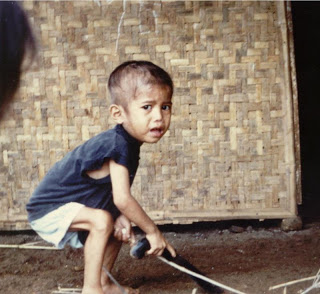
.
"Many forms of women’s bathing suits, for example, would suddenly become illegal. Any publications or works of art that showed all but a fully-dressed female form, too, would conceivably be off limits. So would many cultural events, such as those in tourist destinations like Bali." - Indonesia Update
~~
From The Jakarta Post, Saturday, April 29, 2006
Social workers say they’re alarmed by local administrators’ lack of interest in the problem of malnutrition, claiming the problem is being muzzled in the name of politics.
Subdistrict heads often refuse to acknowledge the existence of poorly-fed children, they said. Some even go as far as forbidding social workers to mention the word “malnutrition” in reports, a social worker from the Healthy Indonesia Foundation, Leny H.R., told a media forum Thursday organized by the Coalition for a Healthy Indonesia.
“Maybe they’re afraid of how a public acknowledgment like this would affect their careers,” she said.
The lack of government support has forced Leny herself to treat 20 malnourished children under two years old in the Mulyaharja subdistrict, Bogor Selatan district, Bogor.
“Luckily some private donors have come up and provided funding for the 20 children for three months, until the end of April,” she added, explaining that the donors provided milk, biscuits, and Rp 50,000 (about US$5.7) a day for food.
Leny said that she would have to find new sources of funding to continue the treatment for the next three months.
“It’s shameful that they (the local administrations) won’t acknowledge a major problem like this,” the head of the Health Ministry’s nutrition alert division, Tatang S. Falah, said in the media forum.
He said the Health Ministry’s policy was for people to report even one incidence of malnutrition to the nearest health institution or worker in their area, within 24 hours of discovery.
“Because it may not be an isolated occurrence, we treat that particular case, but we also immediately investigate the area for similar cases,” Tatang said.
The ministry recorded a prevalence rate of 23.2 percent for malnutrition in West Java in 2003, and 21.53 percent in Jakarta.
~~

No comments:
Post a Comment